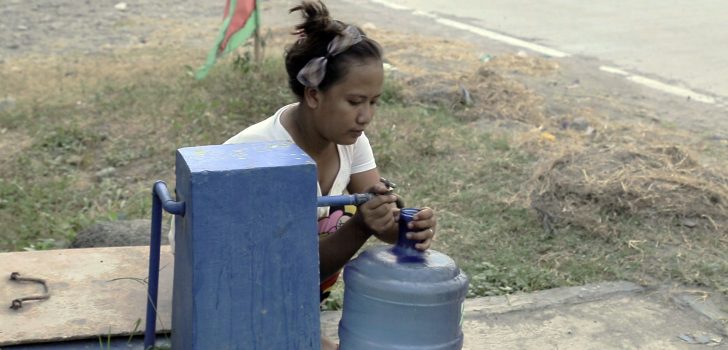 A child fetch water from a nearby water tap stand. On-going construction of Kasilak Potable Water System. This PWS will soon provide safe drinking water to the residents of the community. (Photo from MIS)
A child fetch water from a nearby water tap stand. On-going construction of Kasilak Potable Water System. This PWS will soon provide safe drinking water to the residents of the community. (Photo from MIS) Potable Water Supply projects bring health, economic benefits
Time spend in collecting safe water could mean lost in economic opportunities for people in the community who spend hours, multiple times per day, waiting in long lines at community water kiosks or distant source of water.
The Province of Davao del Norte availed the support from the Department of Agriculture Philippine Rural Development Project to address the lack of safe water by funding the two Potable Water Supply Level II project worth P10 million in Brgy. New Malaga (Dalisay) and Brgy. Kasilak in Panabo City.
The construction of Kasilak PWS worth P6 million is almost completed with 90.56% completion as of April 30,2019. The implementation of potable water supply in Brgy. Kasilak aims to provide safe drinking water to 60% of total number of households in the barangay; improve the health and living conditions with the cost reduction in medical treatment by 30% of the barangay residents; reduce the incidence of morbidity rate due to water borne diseases by 30%; reduce the number of hours in fetching water by 83.33% from 30 minutes to 5 minutes; and employ 26 unskilled workers and 6 skilled workers during the construction of the PWS.
Meanwhile, the Construction of Dalisay PWS worth P4 million with 82.65% accomplishment will soon supply quality and adequate water to 162 households in the barangay. They will also expect a reduced number of hours in fetching water by 63% from 120 minute to 45 minutes; and reduced the incidence of morbidity rate of the residents by 20%. The project also provide addition job opportunities to 40 unskilled workers and 7 skilled workers.
The components of the subproject are the installation of 5hp pump and motor, chlorine disinfection system (hypochlorinator), a 42 cubic meter capacity ground tank, 5,653.98 meters of pipelines ranging from 63 mm to 100 mm in diameter, installation of 42 communal tap stands and miscellaneous items such as valves and fittings.
The realization of these other infrastructure project will benefit the communities especially the women who do most of the household chores and children below 5 years of age who are susceptible to water borne diseases.
By improving the health living condition of the community, they will have additional savings instead of spending it on health problems.
Safe water at home also empowers women and their families to explore their income-generating potential since they have enough time to earn money or think about potential business. (Joy Montecalvo)
